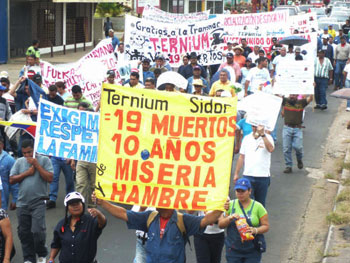One year ago the SIDOR plant was nationalised. Since then there has been ongoing battle between the workers who want to implement genuine workers’ control and those elements who are doing everything possible to make the attempts to build a ”socialist enterprsie” fail. This is part of the general struggle between revolution and reformism within the Venezuelan labour movement.
More than one year has passed since Venezuelan vice-president Ramón Carrizales announced the decision of Chávez to nationalize SIDOR, the massive steelworks located near Ciudad Guayana in the eastern part of Venezuela, which employs nearly 15,000 workers. The decision to nationalize SIDOR which was proclaimed on April 8 last year, represented a historic victory for the workers in the plant.
SIDOR was created back in 1958 and was state-owned until 1997, when former president Rafael Caldera chose to privatise it. This was carried out by Teodoro Petkoff, who was Minister of Labour at that time. Today Petkoff is infamous for his violent opposition to Chávez, editing the ultra-right-wing newspaper Tal-Cual. In 1997 at the time of the privatisation, Petkoff stated that state-owned enterprises were so “inefficient” that it was better to give them away for free, than to keep them state-owned!
Privatisation had the most terrible consequences for the workforce. Once the Argentinean multinational Techin got hold of the enterprise they began an all-out onslaught against the conditions of the workers. From around 18,000 contracted workers in 1997, the figure was reduced to 4,500, and sub-contracted labour was employed on a massive scale. Obviously this affected the lives of thousands of working class families who had their main income reduced or were hit by unemployment.
SIDOR is one of the traditional strongholds of the Venezuelan workers' movement and has seen many historic trade union battles, pickets and strikes. From 1997 to 2008, the workers lived through what they themselves describe as a “living nightmare”, a capitalist multinational trying to squeeze maximum profits out of the workers.
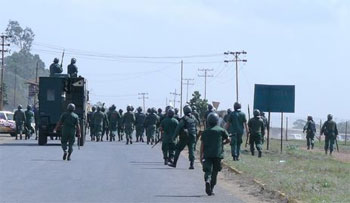 The national guard was at one point used against the workers of SIDOR in their struggle. It is no exaggeration to say that nationalization was thanks only to the heroic fight and determination of the SIDOR workers who kept struggling despite the boycott of all the media, despite the ferocious opposition of José Ramon Rivero (who was Minister of Labour until the end of April 2008), despite the sabotage by many bureaucrats in the state apparatus and despite the betrayal of some of the leaders of the trade union, Sutiss. The movement of the workers removed all obstacles, including repression of the National Guard who violently broke up a workers' demonstration during the struggle and wounded and arrested several workers.
The national guard was at one point used against the workers of SIDOR in their struggle. It is no exaggeration to say that nationalization was thanks only to the heroic fight and determination of the SIDOR workers who kept struggling despite the boycott of all the media, despite the ferocious opposition of José Ramon Rivero (who was Minister of Labour until the end of April 2008), despite the sabotage by many bureaucrats in the state apparatus and despite the betrayal of some of the leaders of the trade union, Sutiss. The movement of the workers removed all obstacles, including repression of the National Guard who violently broke up a workers' demonstration during the struggle and wounded and arrested several workers.
Thanks to the determination and iron will of the workers, the first strategic goal was achieved: that SIDOR once again is state-owned. This showed how the struggle of the workers can point the way towards Socialism and even push Chávez to take decisive measures against capitalism. This is surely an example to follow and contains a profound lesson for the whole of the Venezuelan working class.
Workers keep struggling
Although nationalization was a giant step forward it does not in itself solve the problems at SIDOR. One year after nationalization we see how many of the acute problems remain unsolved. This concerns issues such as the situation of thousands of sub-contracted workers, health and safety conditions in the plant (there have been various accidents resulting in the death of workers recently) and various cases of mismanagement and even corruption.
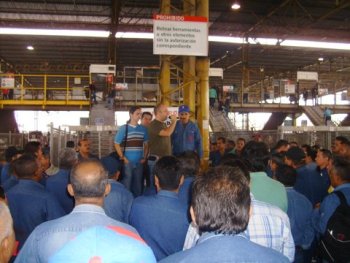 Venezuelan Marxists speaking to a mass meeting of SIDOR workers in December last year. Nationalization has put the workers in a much more favourable position to solve the problems, but has not solved them and cannot solve them in and of itself. One year after nationalization we see that the SIDOR workers are struggling to take advantage of the possibilities for political organization given by the nationalization and are fighting for the implementation of workers' control.
Venezuelan Marxists speaking to a mass meeting of SIDOR workers in December last year. Nationalization has put the workers in a much more favourable position to solve the problems, but has not solved them and cannot solve them in and of itself. One year after nationalization we see that the SIDOR workers are struggling to take advantage of the possibilities for political organization given by the nationalization and are fighting for the implementation of workers' control.
Some sceptics claim that it is impossible to build a socialist enterprise in SIDOR, because of the alleged “low level of consciousness of the workers”. But if we look briefly at recent events, we understand that this is a completely erroneous view.
As already mentioned, it was the tremendous movement of the workers which pushed through the nationalization. Furthermore, immediately after nationalization, it was the workers who guarded the installations and prevented the multinational Techint from stealing instruments, computer systems and documents belonging to the plant in order to sabotage the nationalization. With a clear revolutionary and class instinct, the workers asked the government to immediately send a commission to the company to start the process of handing over management, and that meanwhile they would defend the equipment, materials and technical and administrative information necessary for the normal working of the company.
Another example of the will of the workers to keep struggling was the installation for the first time ever of the UBT (Bolivarian Workers' University) in SIDOR in April 2009. This university, which has been organized by the FRTS (Revolutionary Front of Steelworkers), provides free education to the workers and also political and ideological classes. More than 1,300 workers registered as students in the UBT. This reflects an enormous interest in Socialist ideas and also the desire of the workers to obtain the technical knowledge on how to run the factory.
The election of managers and the role of workers' councils
To this we must add a recent experience of the workers in the “Departamento de Mantenimiento de Crudas”. In August last year the workers in this department organized to oppose the designation of an individual, who has always been closely linked to the Argentinean multinational, as manager of this department.
The workers held an assembly and decided to organize elections among the workers for the position. In this decision they got the support of SUTISS, the trade union in SIDOR. While the individual linked to Techint only received some 30 votes, César Olarte, a well-known Socialist and member of the FRTS, won with more than 80 votes. In the end the company accepted the decision of the workers. A similar process took place in other departments. This experience is particularly important because it shows the way to implement workers' control in practice.
In his speech to the workers of Guayana on March 21 (see Venezuela: Five iron and steel plants and the Carabobo Ceramics nationalised), President Chávez stressed that the workers must elect the managers. The above-mentioned case proves that this is perfectly possible. The election from below of all managers – with the right of recall – is in fact the best way of guaranteeing that these managers are comrades with a real revolutionary and dedicated approach.
As in the case of PDVSA at the time of the lockout in 2002, all conditions are present for the development of workers' control in SIDOR. The union should immediately call a mass meeting to elect a Factory Committee with delegates elected from each workshop, furnace and department in the company, and this committee should take charge of monitoring and overseeing all the operations of the company and watching over managers and engineers. This committee should include the workers in the subcontracted companies in one single body, as the first step towards a single united SIDOR workforce.
At the same time it is crucial that the workers have knowledge of the finances of the company. The books of the enterprise must be opened for the inspection of elected representatives of the workers. It is only possible to carry out democratic planning of production if the workers know the economic situation of the company. In that way it is possible to draw up a plan of production which would benefit the workers and the Venezuelan people as a whole and also to decide democratically which part of production should be exported and which part should be used for the industrial development of Venezuela.
Inside the Venezuelan trade-union movement there is a debate going on on the relation between workers' councils and trade unions. In this discussion, one sector insists on only maintaining the trade unions while other sector speaks in favour of the workers' councils. However, a workers' council is not an organ counterposed to the trade union. The trade union still has a general role as the central platform of struggle for workers’ demands and in the defence of their basic class interests.
The idea that the workers' council should somehow be a competitor and a rival to the trade union is a reactionary idea, mainly put forward by a group in the labour movement around José Ramon Rivero, the ex-minister of Labour. But instead of counterposing the workers’ council to the trade union, what is really needed is an energetic campaign in favour of workers' control, explaining that this is the only way to solve the problems in the factory; sub-contracted labour, workplace accidents and the other daily demands. Such a campaign must be directed towards the rank and file of SUTISS and towards the workers who work in the sub-contracted companies in order to convince them about the necessity of this step and urge them to take action in this sense.
Conscious sabotage
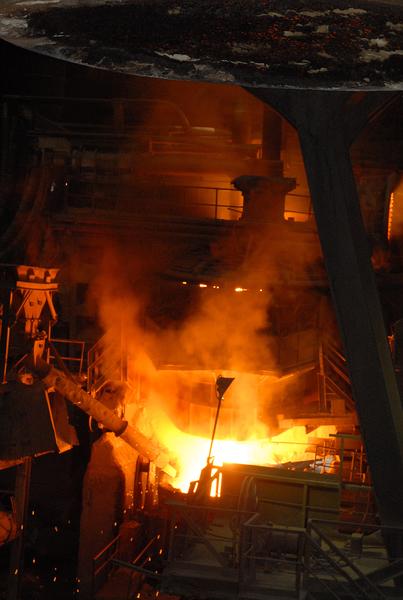 Workers suspect right-wing managers for sabotaging the complicated production process at SIDOR. Photo by Presidencia de la República del Ecuador. Recent events in SIDOR prove that the implementation of workers’ control is not just ”a good idea” but an urgent necessity. There have been several cases of sabotage aimed at bringing production to a halt or to slow it down. On Sunday, June 7, a fire broke out in Midrex II, one of SIDOR's processing plants. In an article in the regional paper, Nueva Prensa on June 10, Alianza Sindical – one of the left-wing trade union factions in SIDOR – stated that this fire was an act of deliberate sabotage:
Workers suspect right-wing managers for sabotaging the complicated production process at SIDOR. Photo by Presidencia de la República del Ecuador. Recent events in SIDOR prove that the implementation of workers’ control is not just ”a good idea” but an urgent necessity. There have been several cases of sabotage aimed at bringing production to a halt or to slow it down. On Sunday, June 7, a fire broke out in Midrex II, one of SIDOR's processing plants. In an article in the regional paper, Nueva Prensa on June 10, Alianza Sindical – one of the left-wing trade union factions in SIDOR – stated that this fire was an act of deliberate sabotage:
“Luis Jimenez, president of the Council of Department Stewards of Sutiss and a member of the above mentioned trade union current, explained that there is strong evidence that the fire was provoked by people who are aware of the plant's productive process, because of the precision in the cutting of the cables which power the direct reduction iron plant (HDR).
“He added that the there are many implications that flow from the accident in Midrex II for production, since that plant is a key element in the production chain at Sidor, as it provides 70% of the raw materials which supply the briquette and plates furnaces. “Whoever carried this out knows Sidor and wants to create massive operational problems in the steelworks.
“Jimenez blamed right-wing managerial layers and workers, who want to create a negative media image for Socialist Sidor and against the nationalization of Siderurgica del Orinoco (Sidor). ‘They want to use these actions in order to create conflicts within the plant, but we will not allow it. The workers will be on guard faced with any other attempt to threaten production and to undermine the historical process we are living in Sidor’.”
This is not at all the first case of sabotage and will definitely not be the last. The fact is that the great majority of managers in SIDOR remain the ones who were appointed by the Argentinean multinational. The majority of these managers signed the 2004 appeal to recall Chávez and also signed an appeal in 2007 against the possible nationalization of SIDOR. As Luis Jiménez correctly points out, these managers are hell-bent on sabotaging production because they want to discredit the idea of a “Socialist enterprise” and show that nationalization was an incorrect decision.
How to build a Socialist enterprise
When president Chávez visited SIDOR on May 12, 2008, he gave a clear mandate to build what he called “a Socialist enterprise”. He said that the main target was two-fold: to maintain an efficient company and to make the conditions of the workers more “human”. But one year after nationalization we see that this is impossible to achieve if the basic capitalist structures remain intact. Without workers' control and management it is impossible to build a Socialist enterprise.
In the context of sabotage and sharp class divisions in the factory, workers' control is not just something that would be nice. It is an urgent necessity. The question is a very concrete one: is it possible to put our faith in the same managers who led the plant during the period in which it was run by the Argentinean multinational? Can we trust people who yesterday signed appeals to oust Chávez and put an end to the revolution? Can we let people who do not have a direct contact with the workers run our factory?
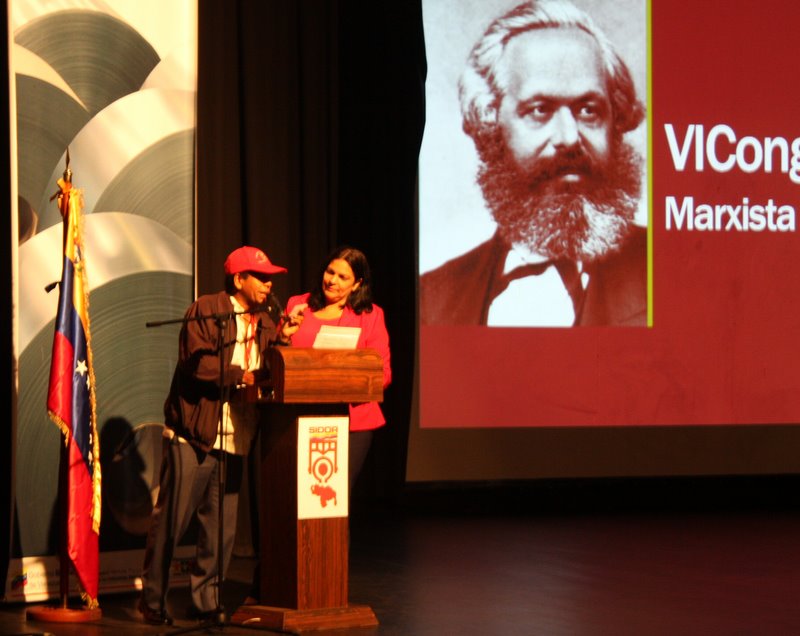 CMR held its important congress in SIDOR this year. The obvious reply is NO. If these counter-revolutionary and bureaucratic elements are left in place they will drive the factory down the road of disaster. The SIDOR workers will fight like tigers to prevent such a development.
CMR held its important congress in SIDOR this year. The obvious reply is NO. If these counter-revolutionary and bureaucratic elements are left in place they will drive the factory down the road of disaster. The SIDOR workers will fight like tigers to prevent such a development.
In his speech on May 21, 2009, Chávez said that he is in favour of workers' control and even of the election of managers by the workers. He also gave a new impulse to the class struggle in Guayana with the nationalization of the briquette companies which are directly linked to SIDOR, Orinoco Iron, Matessi and Tassa. The workers in these factories have now taken concrete steps to organize themselves and are pushing for the implementation of workers' control.
The CMR (Corriente Marxista Revolucionaria, Venezuelan section of the IMT) – which held a successful congress in SIDOR in May – is building its forces in SIDOR and the other factories of Guayana. Only with a strong Marxist tendency, rooted firmly in the most important factories, can the workers win against the corrupt managers and create a genuine workers' administration of the economy as a whole.

